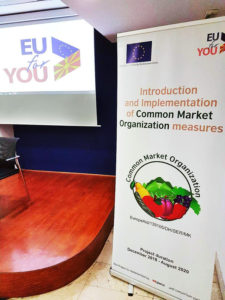
Technical Assistance to Support the Implementation of the Rural Development Sector Development Programme (Phase 1 + 2)
After the positive vote of the Turkish Cypriot community in the 2004 referendum to reunite the island, the European Council decided to end the isolation of the Turkish Cypriot Community and facilitate its integration with the EU. Therefore, the purpose of the project was to improve socio-economic conditions

Enhancing the Employability of Youth and Unemployed/Low-Skilled Workers, and Improving Their Transition to Employment In Egypt
It can be claimed that advancing the structure and performance of the TVET (Technical and Vocational Education and Training) system and TVET deliveries is essential to better respond to new socio-economic needs, in particular, youth employability and increased competitiveness in the context of the country’s current and future

Implementation of Common Market Organisations (CMO) in the Former Yugoslav Republic of Macedonia
The project’s overall objective is to increase marketing opportunities, economic development and overall productivity in the agricultural sector of North Macedonia while improving competitiveness of the agriculture sector in the country in line with EU accession requirements.

Support to Development of a Rural Business Information System in Azerbaijan
This project aims to support the development of a Rural Business Information System (RBIS) in Azerbaijan. The project aims to support rural development by increasing public authorities and other agricultural stakeholders’ capacity to collect and provide publicly available, current, and relevant market information and data related to Azerbaijan’s

Improvement of Legislation, Control and Awareness in Food Safety, Animal Health and Welfare in Ukraine
The project aims to support the implementation of the Association Agreement’s provisions between the EU and Ukraine concerning food safety, animal health, and welfare.

Technical Assistance to Support Direct Grant Management in The Field of Employment Policy
It is essential to keep labour markets alive for every country in the world. As a result, the project aimed to increase the effectiveness of Serbian employment policy in line with the country’s labour market needs by working with institutions and organisations which are responsible for the labour

